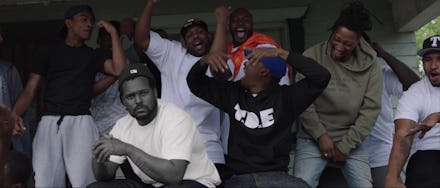If Kendrick Lamar Is Rap's Messiah, ScHoolboy Q Is Its Vital Anti-Hero on 'Blank Face'

Emotions ran high in America the week of July Fourth. In the days following the country's birthday, police were caught on tape killing two black men, and Thursday five Dallas officers were shot and killed, shattering the peace of a Black Lives Matter rally. Our country's lopsided justice system has many asking — once again — if #AllLivesMatter, then why do history and the present show contrary?
This news largely overshadowed ScHoolBoy Q's fourth full length, Blank Face LP, which dropped Friday. Considering ScHoolboy Q was inches from quitting rapping, as he revealed in a Thursday Hot 97 interview, it should be a moment of celebration. Instead the current social climate has the artist and his fans feeling a way.
"I understand bro, on a day I'm supposed 2 Happy I'm sitting Here fucked up about everytHing goin on myself," Q tweeted in response to a fan. Yet no album released so far this summer could be more required listening at this moment in time.
Blank Face thrusts the listener into a world of drug-dealing and gang life, where too little opportunity and too many guns and drugs create debilitating spirals of poverty. It's a place where police violence and profiling seem day to day occurrences, where the most pernicious stereotypes about black criminality come from and where black lives seem to matter least.
The landscape and themes are close to what Q's Black Hippy brother Kendrick Lamar presented us with on his critically-acclaimed To Pimp A Butterfly. That album offered light in the face of all this struggle, giving us "Alright," which became a protest anthem and source of affirmation. Lamar proclaimed self-love on "i," uniting opposing gangs on the single's cover art. Lamar grounded himself in parental wisdom on "You Ain't Gotta Lie (Momma Said)." He found deeper spiritual growth since Good Kid, M.A.A.D. City, working through how to become the Nelson Mandela-esque leader he needs to uplift his community.
But where Lamar is looks to shine light on a brighter future, Q explores chaos. He has many more demons to shed on Black Face: more addictions, affiliations. He captures that struggle to shed them in stark relief. From the title down, the album offers is a perfect rendering of nihilism. Q is drained, and the dissonant, off-kilter beats only escalate the drama of his verses. "The world done flipped on me, took my soul then clicked on me," he laments on the opening track "TorcH," featuring Anderson .Paak. Here is where we step on Q's block, and he teaches us the rules of survival in his Los Angeles neighborhood.
On the Swizz Beatz produced, "Lord Have Mercy," Q contemplates leaving the drug-dealing game. Rapping looks like the most promising way out, but he's unsure if he'll make it. By "That Part," which has a showy feature from the king of bombast Kanye West, Q flosses his newfound success, but he still can't shake the disillusionment that's followed him from his former life selling. "Thank you Mister Reagan/ You helped them dollars rake in," he spits on "Groovy Tony/Eddie Kane." It's dirty money, but when there's little else in reach, something must be compromised.
The album grows more introspective towards the end, but it remains similarly bleak. On "Neva Change," featuring TDE's first lady SZA, Q contemplates racial strife, economic disempowerment and the inescapability of violence. In one brutal passage, he raps:
When white folks point the finger/ Place my neck on that hanger/ Shit, no wonder we riot/ Niggas still killin' niggas/ Child support killin' niggas/ Cops enslavin' us niggas/ Little girls killin' mothers/ They treat their kid like a brotha/ Fathers stuck with them lifers/ Kept it real with his niggas/ But left his kid for the sucks.
Q reflected on the song Friday, lamenting the fact that though he wrote it over a year ago, the picture it paint is still just as accurate today.
Where Lamar has his parents, elders, holy water to help him find direction, Q finds no one. His parents are caught up in a ugly, generational curse on "Black Thoughts." "I'm gangsta, Crip, my poppa was a bitch/Left me where hopeless don't exist/ And every neighbor got a fence/ With bars and windows, my mom's slavin' for the rent," he raps. When he tries to shift his mentality at the track's end, longing to break these cyclical chains, his peace lasts for a track, before he's right where he started at the end. "Let's put the rags down and raise our kids," he raps, calling for a truce between Crips and Blood members. "Real nigga shit, all lives matter, both sides."
Q's call could not be more timely. Friday, images flooded the internet of Bloods and Crips coming together during an Atlanta Black Lives Matter protest, calling a truce in the wake of recent incidents. Friday, Cali rap vets Snoop Dogg and the Game called for men regardless of race and gang affiliation to march to LAPD headquarters, where they met with officials to discuss community and police relationships.
It's reminds us that although Q's story is not pretty, yet it is still a truth many Americans are living and working to make sense of. It's not gangsta rap to be simply gawked at, or yawked at. Q seeks solutions, and dares his listener to do the same. It doesn't necessarily provide answers like To Pimp a Butterfly, but it asks the right questions about the nature of addiction, gang violence and poverty. It asks the listener to understand their pervasive, tempting, intractable nature — and that feels a good start. Because true healing and solutions can only come by way of understanding.
Read more: